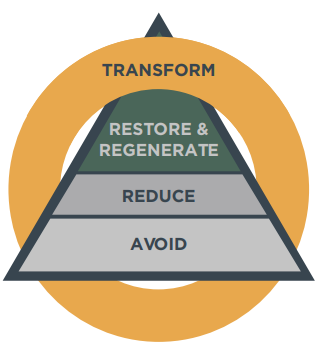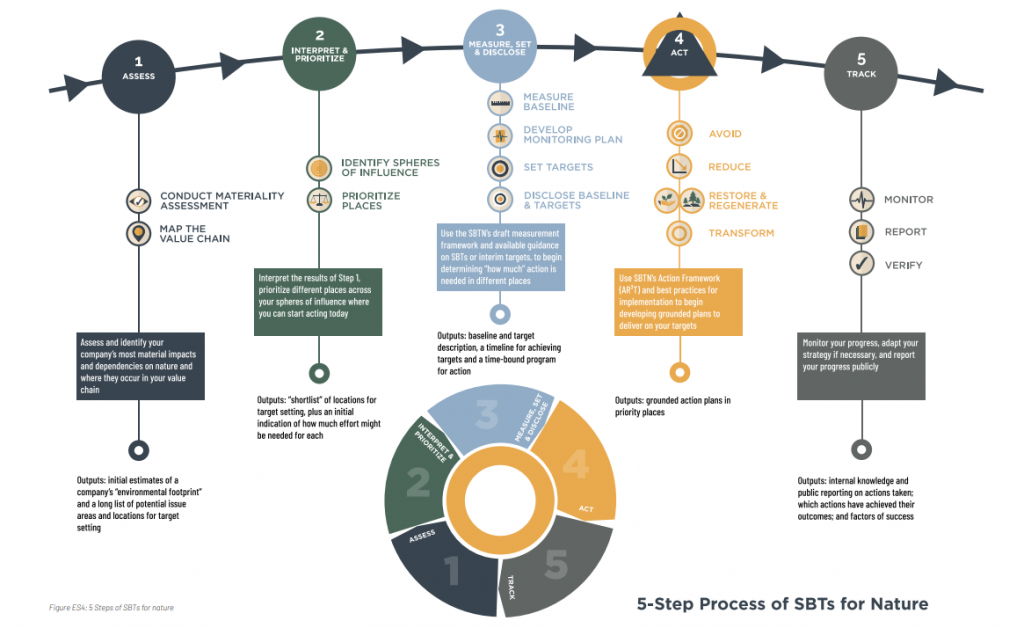The ecosystem has benefited humanity for millennia by protecting from floods, regulating diseases and pests, absorbing and transforming carbon-dioxide, maintaining habitats and, above all, providing food and water. But the IPBES, the Intergovernmental Platform on Biodiversity and Ecosystem Services warns, that the failure to protect ecosystems would lead to catastrophic consequences for people and nature. Companies are also becoming more aware that they need to change themselves and the way they do business. After all, the threat for biodiversity is one of the biggest business risks, along with climate change and water risks.
Science based targets and the loss of nature
Science based targets (SBTs) support businesses on how and how much to change. SBTs are measurable, actionable, and time-bound objectives, based on the best available science, that allow actors to align with Earth’s limits and societal sustainability goals.
While initially focused on climate change, the scope of STBs has recently expanded to the loss of nature/ biodiversity. By using the synergies from both areas, the aim is to ensure that actions from one area generate positive impacts in the other area.
To counteract the loss of nature, the Science based target Network (SBTN) published an Initial Guidance („SCIENCE-BASED TARGETS for NATURE – Initial Guidance for Business“) in September 2020. The report provides initial guidance on how companies can set SBTs for nature. Nature focussed SBTs enable companies to take actions in accordance with existing UN conventions, such as the UNCBD, UNFCCC, UNCCD as well as the SDGs.
The global goal for nature set by the SBTN in collaboration with a group of leaders from various organisations, is: nature positive. The premise of a nature positive world includes no net loss of nature from 2020, a positive state of nature by 2030 and full restoration of nature by 2050. Understanding how nature loss occurs, is essential to achieving the goal.
IPBES, has found that five main pressures are leading to a global deterioration in the state of nature: (1) land and sea use change; (2) direct exploitation of organisms; (3) climate change; (4) pollution; and (5) invasion of alien species. These different pressure areas, in turn,results from underlying drivers, mainly human values and behaviours.
SBTN’s Action Framework: relevant actions companies can take for nature
To achieve the „nature positive“ goal, ambitious action by all stakeholders is needed. In an Action Framework (AR3T) the SBTN emphasizes key types of actions that companies should take to align to Earth’s limits and societal goals for nature (see Fig.1).

a) Avoid and reduce the pressures on nature loss, which would otherwise continue to grow.
b) Restore and regenerate so that the state of nature can recover (e.g., the extent and integrity of ecosystems and species extinction risk).
c) Transform underlying systems, at multiple levels, to address the drivers of nature loss
Depending on their sector and the specifics of their business, companies can set their own goals. However, the problems that business and society face are to a large extent, system-wide, intertwined, and connected to a broad array of actors. This requires companies to exploit system-level collaboration and transformation.
5-Step process of SBTs for Nature – Setting SBTs for nature
The guidance also provides a five-step process (Fig.2) that companies can follow to gain an understanding of environmental issues and address them for the first time. Fig. 2 shows each step, including the outputs from each step. It becomes clear that each process step can be viewed as both a linear, step-by-step process as well as an iterative, circular process of ongoing improvement.

Fig. 2: 5-Step process of SBTs for Nature
There will be further developments of key methods in the coming years, which the SBTN is working on in cooperation with the Global Commons Alliance. With the published guidance, companies can start setting initial goals and can get started on today. Further instructions what companies can do next and what SBTN will aim to provide with future products, can be seen here.
How the DFGE can support you:
It is the responsibility of all to make sure that we address current sustainability challenge, for the future generations. With the “Net Zero” strategies of the Science Based Targets initiative, you have the opportunity to be sure that your efforts are really impacting the current situation. With a holistic approach, DFGE as a full-service provider deals within its Climate Strategy with the calculation of the carbon footprint up to certification and a possible compensation through climate compensation and protection projects. Don’t wait until it is too late: act now!
We look forward to supporting you with our more than 20 years of sustainability expertise and our customized services! Contact us for more information at or +49.8192.99733-20.









